Third Culture Kids in the Bible: Finding Identity and Belonging Through Faith

THIS POST MAY CONTAIN AFFILIATE LINKS. THIS MEANS WE MAY RECEIVE A COMMISSION FROM QUALIFYING PURCHASES YOU MAKE THROUGH OUR LINKS. KINDLY READ OUR DISCLOSURE NOTICE FOR MORE INFORMATION.
Feeling caught between cultures isn’t new. Third Culture Kids (TCKs) show just how complex it can be.
These are kids who grow up in a culture that’s different from their parents’ home culture. That mix shapes their identity uniquely, often bringing pride and confusion.
We recently bought our children a kids’ action Bible. While reading it, one said, “They also belong to different places.”
We’ve been having ongoing conversations about belonging and identity as a family.
They weren’t just noticing where people lived; they were connecting with what it feels like to be part of more than one place.
That made me pause. It made me reflect on how much these stories connect to our own lives as a TCK family.
I wanted to help my kids see that they’re not alone in this—and honestly, I needed the reminder too.
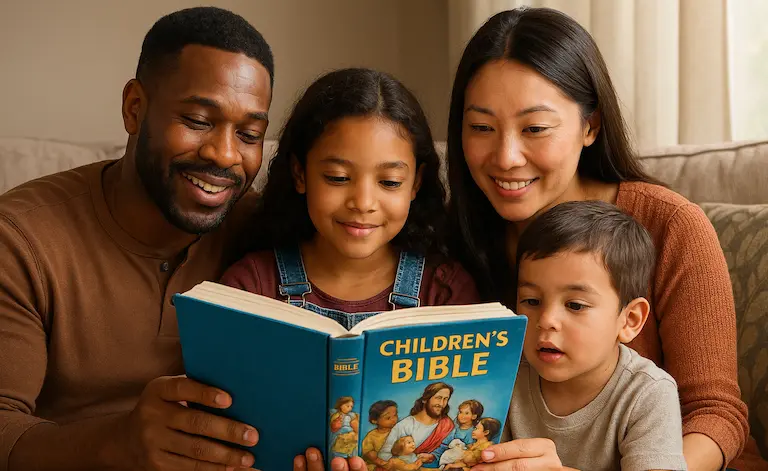
The Bible includes stories that speak to this kind of experience. Take Moses, a Hebrew baby raised in an Egyptian palace who was later called to lead a people he didn’t fully feel part of.
His life gives us insight into what it means to find identity and purpose in faith, especially when home doesn’t feel clear or settled.
When you’re unsure where you belong, the stories of people like Moses show that your identity doesn’t have to be tied to a place. It can be rooted in something deeper and more stable.

Want a Spiritual Practice
That Feels Like Home?
Download your FREE starter guide on Faith & Spirituality and start building a spiritual rhythm that feels authentic, grounding, and grace-filled.
Moses: A Third Culture Kid Before the Term Existed
Moses grew up between two worlds. He was born to Hebrew parents but raised as Egyptian royalty.
His life mirrors the experiences of many TCKs: He is pulled between cultures, unsure where he fits, and often feels like an outsider.
Why Moses’ Story Still Resonates
Moses’ upbringing wasn’t just unusual; it shaped his entire life. He had access to the best education and the privileges Egypt offered, yet he knew he was Hebrew.
That tension is familiar to many TCKs, who were raised with one culture at home and another outside but are not fully part of either.
One moment that stands out is when he names his first son Gershom, saying, “I have become a foreigner in a foreign land” (Exodus 2:22).
It’s a clear sign of how deeply he felt the disconnect. He didn’t feel fully at home in Egypt or with his fellow Hebrews.
The name he chose reflects the emotional weight of living in between.
This speaks to many TCKs who quietly carry their identity struggles, sometimes tying them to the names, languages, or traditions they keep or lose.
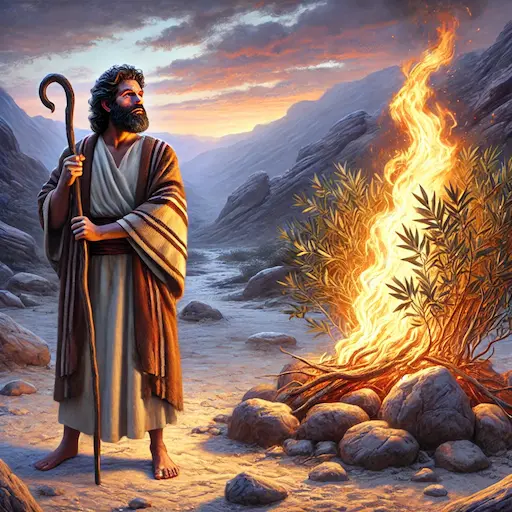
Lessons on Belonging From Moses
Moses didn’t just wrestle with identity; he also dealt with rejection.
It backfired when he tried to stand up for his people and had to flee. That exile could’ve ended his story, but instead, it became a turning point.
In the wilderness, Moses learned humility, learned to listen, and began trusting God more deeply.
Later, when God called him to lead, Moses pushed back. “Who am I?” he asked in Exodus 3:11.
He doubted himself, much like many TCKs who feel out of place when asked to lead or speak up.
But those very insecurities became the reason he had to rely on God. His doubts made space for grace.
Then there’s the painful part. Moses wasn’t allowed into the Promised Land.
After everything he did, he didn’t get to enter the place that represented home and rest.
That moment hits hard for anyone who’s lived most of their life between worlds. It’s that feeling of almost, but not quite, belonging.
From Moses, we learn that it’s okay not to feel fully at home in one place. Belonging can come from faithfulness, not location. And leadership doesn’t require perfection, just trust.

Other Biblical Figures Who Lived Between Cultures
TCKs aren’t just a modern concept. The Bible is filled with stories of people who lived between cultures, navigated new identities, and found belonging in unexpected places.
Joseph: Thriving Despite Displacement
Joseph was sold into slavery and taken to Egypt. Far from home, he still stayed connected to God and his roots.
He rose to power but had to live with the tension of being both insider and outsider.
When he reunited with his brothers, it all came full circle. His story shows how faith can help reframe displacement into purpose.
Ruth: Choosing a New Identity
Ruth left her homeland and chose to stick with Naomi: “Your people will be my people, and your God my God” (Ruth 1:16).
That choice wasn’t easy. She was vulnerable, an outsider. But her faith and loyalty gave her a new place and legacy. She became part of Christ's lineage.
Daniel: Balancing Faith and Assimilation
Daniel was taken from Judah and immersed in Babylonian culture. He was renamed, retrained, and expected to conform.
But he drew a line when it came to his faith. His quiet strength in staying true to his values shows that you can adapt to a culture without losing who you are. (Daniel 1:7-8)
Esther: Finding Strength in Duality
Esther kept her Jewish identity hidden at first, just as Mordecai had advised (Esther 2:10). But when the time came, she chose to speak up, even at the risk of death. “If I perish, I perish” (Esther 4:16).
Living between her faith and her royal role gave her the insight and courage to save her people. She shows that being in between can give you a powerful perspective.

Jesus: The Ultimate Example of Displacement
Jesus lived His whole life as someone who didn’t quite belong. “The Son of Man has nowhere to lay His head” (Luke 9:58).
From birth to crucifixion, He was misunderstood, moved around, and rejected. Yet His mission was clear, and His identity secure.
For TCKs, His life reminds us that we’re fully known even when we feel out of place.
Abraham: Called to Journey Without a Home
God called Abraham to leave everything familiar. He didn’t know where he was going, just that he had to go.
His faith wasn’t tied to a land, but to a promise. His life shows that sometimes the journey is the home. (Hebrews 11:8-9)
Paul: A Citizen of Two Worlds
Paul had Roman citizenship and deep Jewish roots. That combination helped him connect with diverse audiences.
He often felt misunderstood, yet his message stayed clear. “Our citizenship is in heaven” (Philippians 3:20). That mindset helped him remain grounded through cultural shifts.

What These Biblical Stories Teach TCKs Today
The Bible doesn’t promise easy belonging. But it does offer a sense of purpose that holds up even when life feels scattered.
Finding Strength in the Tension of Duality
Living between cultures isn’t always comfortable. But it shapes you.
As TCKs, we learn to adapt, observe, and build bridges. Esther, Daniel, and Moses weren’t just survivors; they were strong because of what they’d been through.
The tension of dual identity builds empathy, clarity, and perspective. These stories remind us that God can use every piece of our experience.
Understanding Belonging Through Faith
You don’t need to feel at home to be at peace. That’s what Abraham, Ruth, and Paul teach us. Home isn’t always a place. It’s who you walk with.
Faith gives you a place to stand when the ground shifts. Jesus had no fixed home, but His mission and message were constant. That kind of clarity comes from knowing who you are in God.
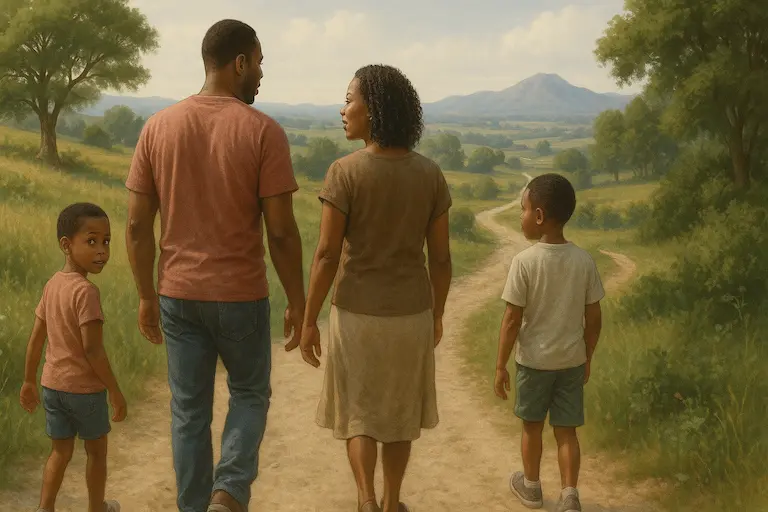
Practical Steps for TCKs Navigating Belonging Today
Belonging takes effort, especially for those who’ve lived in many places. Here are some ways to build rootedness:
- Join communities that feel real. Look for shared values, not just shared backgrounds.
- Stay present, even if it’s temporary. You can make real connections even in short seasons.
- Tell your story. Your journey can help others understand theirs.
- Create what you need. If home doesn’t exist, build it.
Faith reminds us that our identity is more than geography. We’re shaped by the places we’ve been, but we’re grounded in something far greater.
“They only saw them and welcomed them from a distance, admitting that they were foreigners and strangers on earth…” (Hebrews 11:13)
The Bible shows us that feeling in between isn’t a flaw. It’s part of many faith journeys. Moses, Joseph, Ruth, and others lived that reality long before the term “TCK” existed.
Their stories remind us that belonging comes from walking with purpose, not from fitting perfectly into one culture.
If you’ve ever felt caught between places, know you’re in good company. Your story matters. And your in-between can still lead to something significant.
As TCKs, we often try to make sense of identity and belonging through many different lenses.
Looking at these stories, especially with my kids, blessed me in a way I didn’t expect. I hope it adds a bit of nuance to how we think about faith and home.
What does belonging look like for you right now? Share your thoughts. Your journey might help someone else feel a little less alone.
IF THIS POST SPOKE TO YOU, EXPLORE MORE OF THE JOURNEY ON OUR SITE.
You'll find free guides, intentional tools, and reflections to support cultural growth and legacy-building.
💬 Looking for connection? Join our Facebook community to continue the conversation.
📌 Pin an image to revisit or share with someone walking a similar path.
Thank you for being here.
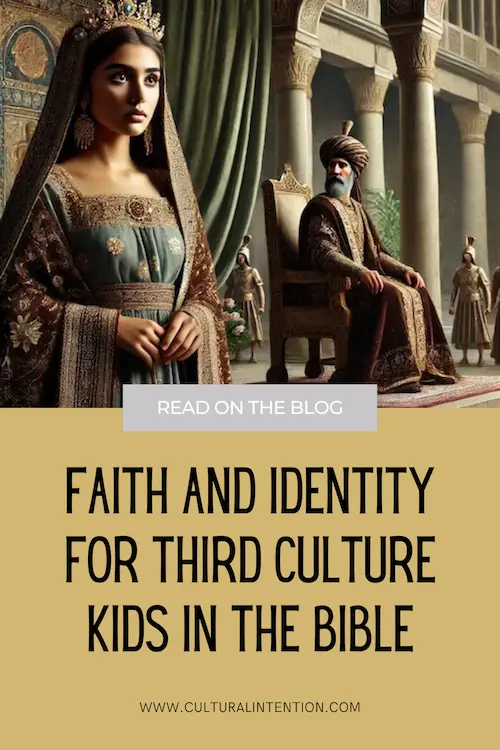
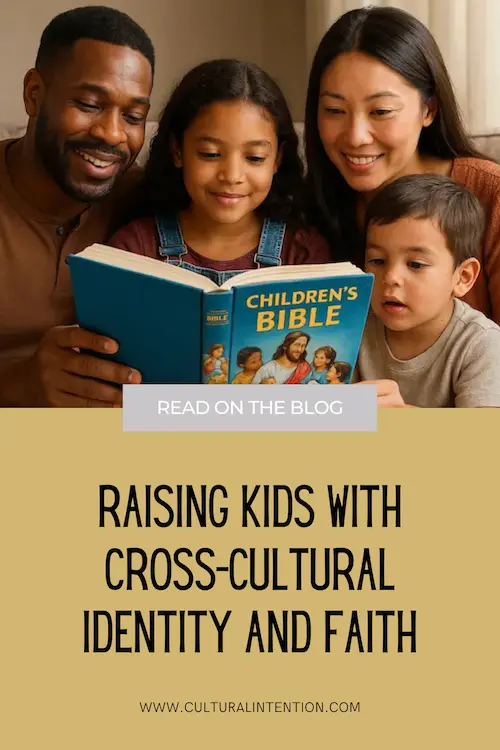
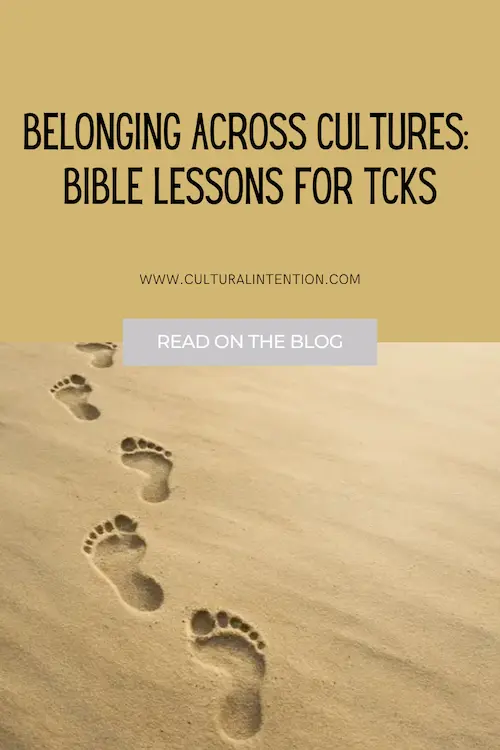
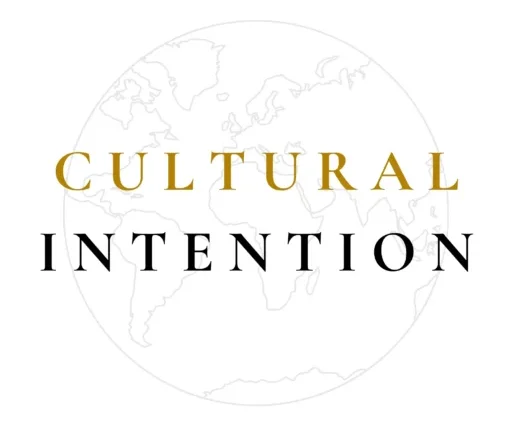



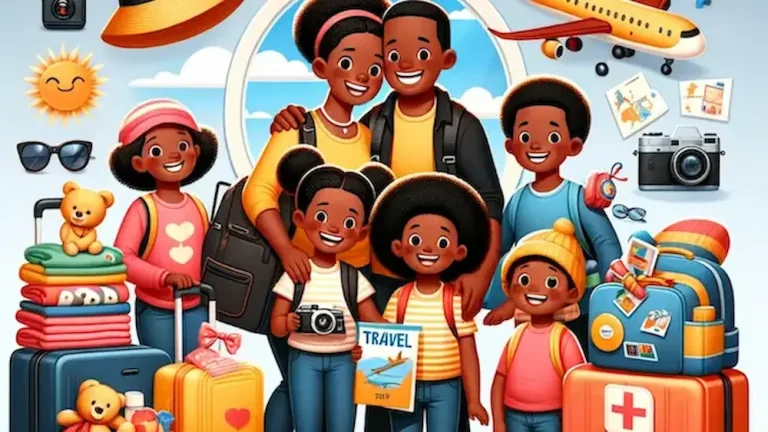


Thank you for these encouraging words, backed by Scripture and examples of God’s great leaders!
I, too, am a TCK, but I never knew that term! I was an MK raise in my early formative years in a different country with prejudice from Americans. I didn’t know that until I came to the States to live “for good” after 8 years away! The US lifestyle and culture seemed foreign! While I felt like I never truly belonged in the States, I knew who I was in Christ, and I had the support of a brother and sister who felt the same as I. We each handled it in different ways. It wasn’t until I went away to a Christian university that I found others like me—other missionary kids who felt like misfits, but we didn’t understand why. There were others who had dads who were were international business people. They were in somewhat similar situations.
This background is to give you an understanding of where God has placed me now, at age 69! Many years after being brought “home” to the States, I know that this world is not my home!! I thankfully grew up knowing this very real fact! I’m just a “poor wayfairing stranger” living the life I’m called to until I get to go HOME!
I lead 17 children in a Burmese congregation of Lisu language people (tribal group). These kids have 3 languages, 2 cultures within those individual languages, and a third culture in mixing them when at home! I found your site as I was searching for how to help these kids—especially teens—and their parents come to an understanding of the situation before their kids. I know life can be fulfilling and true crisis does not need to overcome them.
Your examples of all the Biblical heroes who were TCKers, including our Jesus Christ, has encouraged me with more information to share with the families! Thank you!
I want to ask you for permission to quote a few things you said, and I want to correctly give you credit. Will you please share how this can be done!
Thank you again for your encouraging words, and may God continue to bless you and your family!
Serving our Lord together,
Lydia Pedroza
Galatians 2:20
Proverbs 3:5-6
By the way— my two grandchildren are now and will be for years to come, TCK kids!! I thank God for the adventures ahead of them, and I’ll always pray for God’s leading in their lives!
Dear Lydia,
Thank you so very much for taking the time to share your story and for reading my post. Your words truly touched me. I’m deeply encouraged by how your journey as a TCK (Third Culture Kids) and MK (Missionary Kid) has shaped your heart for others, especially the children and families you’re now guiding in such a meaningful way.
What a gift you are to your Burmese Lisu congregation. I know first hand, navigating multiple languages and cultures at once isn’t easy, but having someone like you who understands those layers makes all the difference. I know your heart for those kids, and for your grandchildren, is very much appreciated.
Yes, absolutely, you’re welcome to quote anything from the blog post. I’m honored you found it helpful. You can simply credit it as:
“Excerpt from Third Culture Kids in the Bible: Finding Identity and Belonging Through Faith by Faith @ Cultural Intention, http://www.culturalintention.com.”
Please feel free to reach out if I can support in any other way. I truly believe our stories can be powerful tools for connection, healing, and hope.
Grateful to be serving alongside you,
Faith
Galatians 6:9 🤎